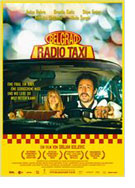

Opening 21 Jul 2011
Directed by:
Srdjan Koljevic
Writing credits:
Srdjan Koljevic
Principal actors:
Nebojsa Glogovac, Anica Dobra, Branka Katic, Jasna Zalica, Nada Sargin
The old and new parts of the city of Belgrade, in what is now Serbia, are connected by a long, much-travelled bridge. In director Srdjan Koljevic’s second film, the bridge is symbolic of the way lives are interconnected as people transverse back and forth.
Gavrilo (Nebojsa Glogovac) is a Bosnian refugee in Belgrade who drives a taxi. He is taken by surprise as his customer, who was sniffling blood into a handkerchief suddenly jerks open the taxi’s door, runs to the railing of the bridge and jumps into the Danube River. Gavrilo is even more surprised when he finds this woman’s baby in his taxi’s back seat. He anonymously tells the police of the supposed suicide and, just as secretly delivers the baby to his only friend: a prostitute named Jadranka (Jasna Zalica), also from Bosnia. She reluctantly agrees to help, while Gavrilo considers some solutions. Two witnesses to the accident are Anica (Anica Dobra), a teacher, whose child died thus ending her marriage and who is being stalked by a student named Marco who thinks that he is adopted, and Biljana (Branka Katic) who lost her boyfriend but cannot resist the advances of his married brother. As the story progresses we see Gavrilo in the hospital visiting Jasmina, the (not dead but in a coma) mother of the baby (Nada Sargin) and later her boyfriend Vuk who gives Gavrilo a bloody nose. Thus one small leap into the river is threaded onto the next event as these simple people attempt to solve their problems.
Koljevic, who wrote the script, said that the bridge can also be symbolic of the bridge “between yesterday and tomorrow.” Naturally, the history of former Yugoslavia, which is now Serbia, Croatia, and Bosnia and Herzegovina is connected to the future of its citizens who attempt to make their ways in this new world, where it seems to rain every day and people walk or drive through a grey mist. The music, which often comes out of various taxi radios, is old rock and roll from Yugoslavia. Koljevic definitely reached his goal of “warm-hearted humor in a small film, about people who throw off old ballast in order to be free to continue with their lives.” It’s also interesting to see the city of Belgrade (where it was filmed, as well as in Erfurt). The talented actors make the story come alive. I think I liked Jadranka, the prostitute, the best; she seemed to be the least susceptible to emotional indecision. (Becky Tan)